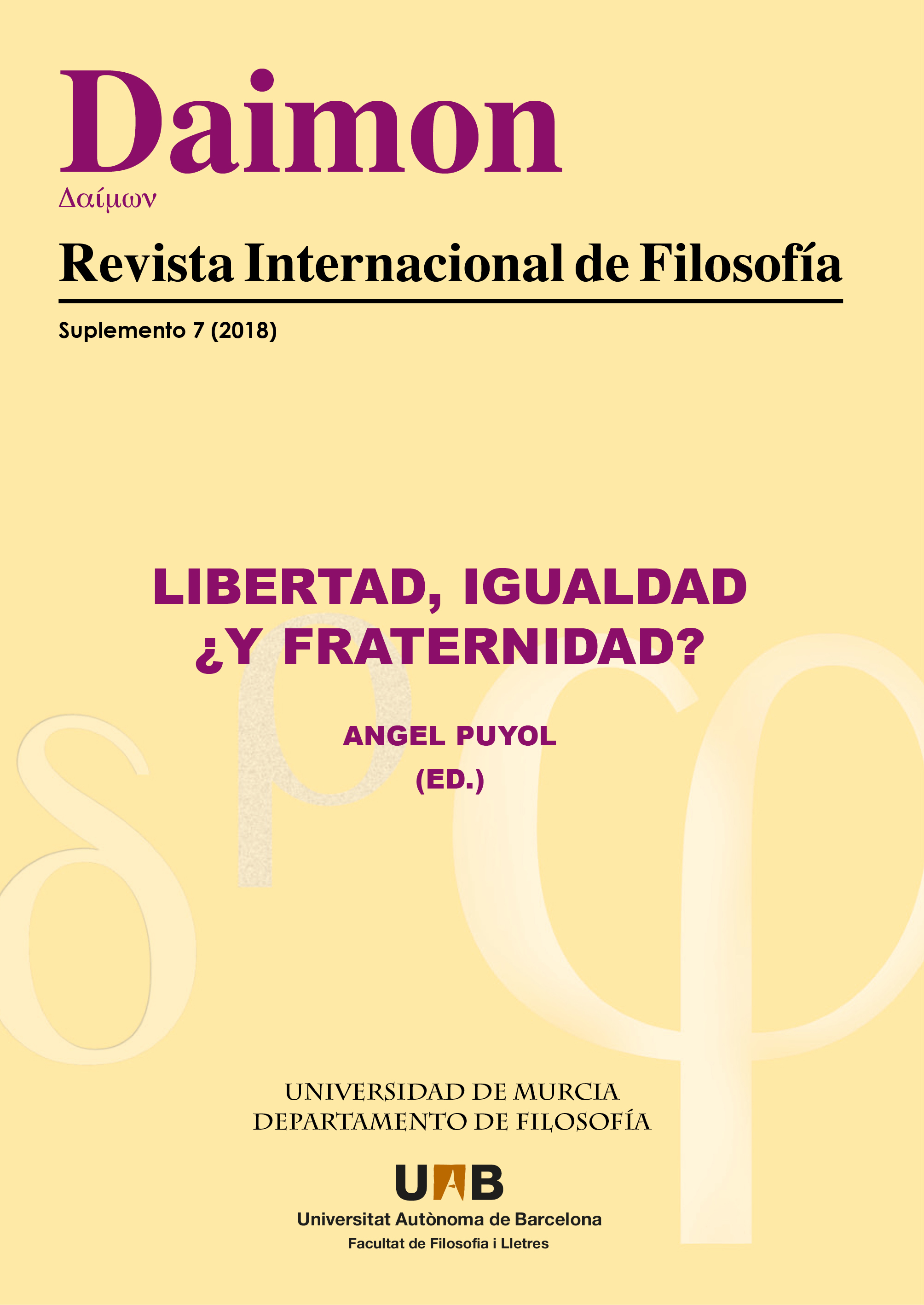Fellow Feelings: Fraternity, Equality and the Origin and Stability of Justice
Resumen
This article presents an analysis of the role that the idea of fraternity plays in John Rawls’s A Theory of Justice. Many commentators, G.A. Cohen for example, have taken as their target the role of fraternity in understanding the difference principle. (‘A further merit of the difference principle is that it provides an interpretation of the principle of fraternity.’) The article highlights the neglected connection between Rawls’s principle of fraternity and the role of sentiments in A Theory of Justice. I focus, in particular, on the third part of A Theory of Justice, which has received less attention in the secondary literature. The main idea put forward is that, contrary to what his egalitarian critics contend, the Rawlsian conception of fraternity constitutes the most plausible version of this political ideal: one which is properly egalitarian.Descargas
-
Resumen970
-
pdf558
Citas
Anderson, E. (1999) ‘What is the Point of Equality?’, Ethics, Vol. 109, No. 2, pp. 287-337
Cohen, G. A. (1989) ‘On the Currency of Egalitarian Justice’, Ethics, Vol. 99, No. 4, pp. 906-944
Cohen, G. A. (1992) ‘Incentives, Inequality and Community’, in G. Peterson (ed.), The Tanner Lectures on Human Values, vol 13, Salt Lake City: University of Utah Press, pp. 263-329
Cohen, G. A. (1997) ‘Where the Action Is: On the Site of Distributive Justice’, Philosophy & Public Affairs, Vol. 26, Issue 1, pp. 3–30
Cohen, G. A. (2008) Rescuing Justice and Equality, Cambridge Mass.: Harvard University Press
David, M. (1987) Fraternité et Révolution française, Paris: Aubier
David M. (1992), Le printemps de la fraternité: genèse et vicissitudes 1830-1851, Paris: Aubier
Estlund, D. (1998) ‘Liberalism, Equality and Fraternity in Cohen’s critique of Rawls’, Journal of Political Philosophy, Vol. 6, Issue 1, pp. 99–112
Frankfurt, H. (1987) ‘Equality as a Moral Ideal’, Ethics, Vol. 98, No. 1, pp. 21-43
Munoz-Dardé, V. (1998) ‘John Rawls, Justice in and Justice of the Family’, The Philosophical Quarterly, Vol. 48, No 192, pp. 335–35
Munoz-Dardé, V. (2005) ‘Equality and Division: Values in Principle’, Proceedings of the Aristotelian Society, supplementary volume 79, pp. 255-284
Munoz-Dardé, V. (2014) ‘Luck Egalitarianism’, Rawls Lexicon, eds David Reidy and Jon Mandle, Cambridge University Press, pp. 471-480
Nozick, R. (1974) Anarchy, State, and Utopia, New York: Basic Books
Rawls, J. (1971) A Theory of Justice, Cambridge Mass.: Harvard University Press, Revised edition 1999
Rawls, J. (1999) ‘Social Unity and Primary Goods’, Collected Papers, ed. Samuel Freeman, Cambridge Mass.: Harvard University Press, pp. 369-370.
Rawls, J. (2001) Justice as Fairness: A Restatement, Cambridge, Mass: Harvard University Press, edited by Erin Kelly
Sandel, M. (1982) Liberalism and the limits of justice, Cambridge: Cambridge University Press
Scheffler. S. (2003) ‘What is Egalitarianism’, Philosophy & Public Affairs, Vol. 31, No 1, pp. 5-39
Temkin, L. (2003) ‘Egalitarianism Defended’, Ethics, vol. 113, pp. 764-782
Wiggins, D. (2009) ‘Solidarity and the Root of the Ethical’, Tijdschrift voor Filosofie, 71, No 2, pp. 239-269
Las obras que se publican en esta revista están sujetas a los siguientes términos:
1. El Servicio de Publicaciones de la Universidad de Murcia (la editorial) conserva los derechos patrimoniales (copyright) de las obras publicadas, y favorece y permite la reutilización de las mismas bajo la licencia de uso indicada en el punto 2.
2. Las obras se publican en la edición electrónica de la revista bajo una licencia Creative Commons Reconocimiento-NoComercial-SinObraDerivada 3.0 España (texto legal). Se pueden copiar, usar, difundir, transmitir y exponer públicamente, siempre que: i) se cite la autoría y la fuente original de su publicación (revista, editorial y URL de la obra); ii) no se usen para fines comerciales; iii) si remezcla, transforma o crea a partir del material, no podrá distribuir el material modificado.
3. Condiciones de auto-archivo. Se permite y se anima a los autores a difundir electrónicamente las versiones pre-print (versión antes de ser evaluada) y/o post-print (versión evaluada y aceptada para su publicación) de sus obras antes de su publicación, ya que favorece su circulación y difusión más temprana y con ello un posible aumento en su citación y alcance entre la comunidad académica. Color RoMEO: verde.











